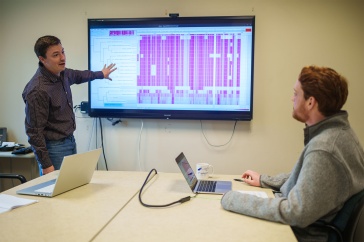The NH Agricultural Experiment Station recently hosted “Connecting the Dots for Pollinator Conservation: Wildflower Meadows and Pollinator Habitat.” Pollinators are essential for most of the fruit and vegetable crops produced in New England. The value of pollination to agriculture is estimated at more than $200 billion a year worldwide. However, the abundance of and diversity of pollinators are declining in landscapes across the United States.
“The interest in helping pollinators has been astounding. There are literally hundreds of pollinator gardens and habitats that have been installed in New Hampshire alone in the last few years,” said Cathy Neal, researcher with the NH Agricultural Experiment Station and landscape horticulture specialist with UNH Cooperative Extension.
In addition, maintaining a robust and diverse natural environment requires healthy populations of pollinators. New Hampshire has a rich diversity of native bees that provide pollination services, often more efficiently than managed colonies of honey bees. However, habitat loss associated with land use changes is one of the leading threats to pollinators, along with climate change. Neal’s research focuses on how we can best provide safe habitat and a healthy food supply for native bees and other pollinators in gardens, fields, and neighborhoods.
Learn more about you can do to support pollinators.
-
Written By:
Lori Wright, '06G | NH Agricultural Experiment Station | lori.wright@unh.edu | 16038621452

















































